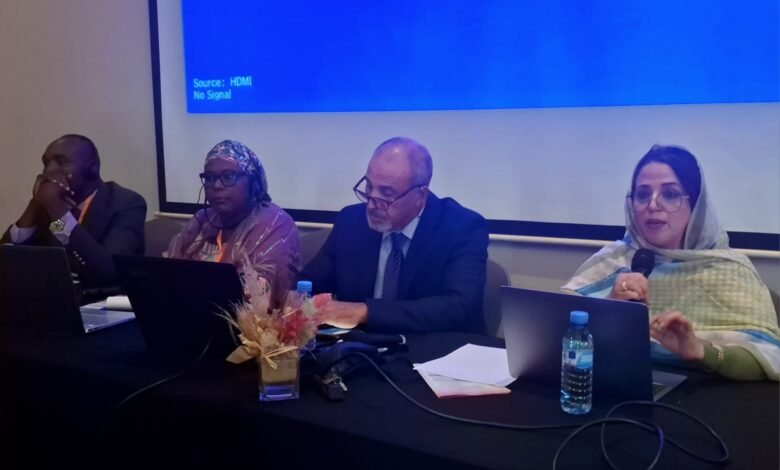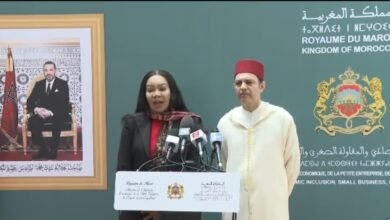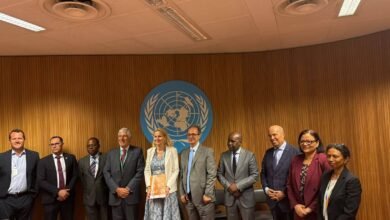Turning Rights into Results: Aicha Duihi’s Call for Binding Human Rights Commitments in Arab-African Economies

By Karima Rhanem, Senior Managing Editor
At the Arab-African Forum on Business and Human Rights held in Marrakech on June 24 and 25, 2025, Ms. Aicha Duihi, President of the International Observatory for Peace, Democracy and Human Rights in Geneva, delivered a compelling message to political leaders, institutional actors, and private sector representatives. For her, embedding human rights at the heart of economic governance is not a moral accessory, but an indispensable strategy for achieving sustainable and inclusive competitiveness across the Arab-African region.
Participating in Workshop 7 dedicated to “Good Governance and Transparency,” Ms. Duihi framed her intervention around the theme “Respect for Human Rights: A Prerequisite for Sustainability and Competitiveness in the Arab-African Region’s Economies.” From the outset, she emphasized that economic growth devoid of rights-based foundations inevitably leads to fragility, inequality, and social exclusion. Her address challenged the conventional view that human rights obligations are incompatible with market dynamics. On the contrary, she argued, human rights act as accelerators of trust, investment resilience, and long-term prosperity.
Ms. Duihi pointed to the mounting contradictions witnessed across the region: a dynamic investment climate often coexists with deepening social disparities, informal labor practices, and institutional shortcomings. In the absence of regulatory frameworks that ensure justice and equity, she warned, the gap between economic ambition and social reality will only widen, further marginalizing vulnerable populations—especially women and youth.
Central to her message was the urgent need to operationalize the United Nations Guiding Principles on Business and Human Rights. These principles, according to Duihi, provide a universally recognized foundation for responsible economic behavior. They define the state’s duty to protect, the corporate responsibility to respect, and the right of affected individuals and communities to effective remedy. She underscored the relevance of moving from theoretical support to institutional implementation through what she described as a “smart mix” of voluntary and mandatory mechanisms.
Ms. Duihi called for firm commitments to mandatory human rights due diligence in both public procurement and foreign direct investment. She advocated for transparency-enhancing tools such as ethical labeling, the integration of digital technologies to identify and manage risks early, and the establishment of grievance mechanisms that are not only independent but also accessible and centered on affected communities. Equally important, she stressed, is the role of civil society and small and medium enterprises, which must be empowered through targeted capacity-building and a structured presence in economic decision-making spaces.
Addressing territorial inequality, she highlighted that regions such as the Sahel and remote parts of North Africa are not lacking in potential—they are deprived of equal opportunity and visibility. Fair investment strategies that take into account local realities and prioritize social cohesion, especially through the inclusion of women and youth, represent a key entry point for shared prosperity. She called for regional platforms to exchange best practices and reinforce South-South cooperation as a means to localize global standards without compromising core human rights values.
Ms. Duihi concluded with a resolute message: the time has come to move beyond the language of recommendations. The Arab-African region must shift toward binding commitments, where human rights are not merely referenced in economic policies but serve as benchmarks of performance, credibility, and long-term viability. “Competitiveness that is not rooted in respect for rights,” she declared, “is short-lived, fragile, and ultimately counterproductive.”
Her intervention stood out in a panel marked by high-level contributions. Workshop 7 was moderated by Mohamed Ayat, a member of the UN Committee on Enforced Disappearances. Mr. Rabi El Abid Amrani of Morocco’s Ministry of Economy and Finance explored fiscal integrity as a pillar of governance. Mr. Naoufal Ouldelmehdi from Morocco’s National Authority for Integrity and Anti-Corruption shared institutional approaches to fighting corruption. Mr. Nizar Touhami Chahdi, policy analyst at the OECD, highlighted global standards for responsible business conduct. Mr. Cheffou Ouma-Lahérou of Niger’s Ministry of Justice addressed the challenges of legal enforcement in fragile contexts. Mr. Djétourané Mbaihoundarou Abel from Chad’s Prime Minister’s Office discussed political will and governance reforms. Finally, Ms. Naima Akouri, Head of Certification at IMANOR, emphasized the role of standardization in reinforcing transparency and business accountability.
Together, the voices of the session reflected a shared understanding that the path toward sustainable and inclusive development in the Arab-African region must be built on the solid ground of human rights, accountability, and cooperative governance. Ms. Aicha Duihi’s intervention gave that vision its clearest and most uncompromising expression.





